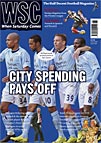 The world of Twitter is gaining more followers by the day, with clubs now producing their own official pages. Ian Plenderleith tries to work out what all the fuss is about
The world of Twitter is gaining more followers by the day, with clubs now producing their own official pages. Ian Plenderleith tries to work out what all the fuss is about
People who have never looked at Twitter (twitter.com) tend to ask: “What is Twitter actually supposed to be?” They used to ask the same things about email and blogs, but then at least a feasible, semi-coherent explanation could be given to even the technologically inept. Once you’ve been inside the super-inane world of Twitter, however, a response is much more challenging, because the point still eludes you. It’s perhaps best described as mankind’s best attempt to waste millions of hours since the invention of prayer.
Most broadsheets have already attempted a psychological analysis of people who post on Twitter, so we won’t probe any further the theories about narcissism, attention-seeking and technology-based addiction. Instead, let’s be straightforward and see if Twitter can enhance your life as a football fan. How is Twitter’s big question – What are you doing now? – applied to the football world and translated into a 140-character response?
Let’s say, God forbid, that you’re a Chelsea fan who cannot make it to the stadium for your team’s Champions League quarter-final second leg against Liverpool. Television coverage has not started yet, but you are so excited that you somehow want to be part of the build-up. This is where Chelsea FC’s Twitter feed will inject your life with pre-match meaning. “The crowds are building up at the Bridge for tonight’s game,” you will be told. Later you will be updated with the news that: “Steven Gerrard is walking round the pitch, away from the tunnel. Interesting.” Kick-off approaches: “Petr Cech and Hilario are already out warming up.”
This is about as interesting as Twitter gets. There are a lot of users providing by-the-minute updates on games as they happen, but team and media sites have been doing that for years. In the same vein, many bloggers and newspaper sites simply use Twitter to alert readers to new posts and articles, and so they merely become another RSS feed, just in a slightly different format.
Fans themselves are a little more expressive, using Twitter as a mass audience text messager. “I do not particularly care for Liverpool, but you cannot deny the atmosphere at Anfield is always top notch,” says an oh-so-true post at Two Yellows = Red after Arsenal’s 4-4 draw on Merseyside. Arseblog, meanwhile, is “still gobsmacked by last night and disappointed we didn’t win it. Twice this season we’ve thrown away leads in injury time in 4-4 draws.” Of all the rotten luck. The tweeter at footballmaniacs thinks “the Baggies would have been at least four or five places above relegation if they’d sorted their defensive problems”. You might hear the same thing from a colleague at work making small talk on your way through the office door, and have forgotten it by the time you reach your desk. Thank heavens the internet will preserve such analyses for the record.
Individual players? We know from years of sorry experience that the footnotes to an auditor’s report on a Staines-based cardboard box manufacturer cast more light on the human condition than a player’s personal website, but perhaps the necessity of condensing a message will induce our heroes to serve up succinct, pithy wisdom. Former QPR striker Danny Dichio is on Twitter, and says after a loss suffered by his latest team, Toronto FC: “Disappointed at the weekend. Now we have to dust ourselves off, train hard and get ready for Dallas.” In case you haven’t grasped that, the football player was unhappy at losing, but is determined to bounce back. Meanwhile, DC United’s Bryan Namoff assures his readers: “GAMEDAY! I’m ready to go. Trying to keep the mind busy so I don’t start counting the hours down.” How he’s keeping his mind busy, we never find out. Perhaps by scanning Twitter for all Michel Foucault quotes of fewer than 140 characters.
The Women’s Professional Soccer league in the United States announced before its launch this spring that its players would be allowed to “tweet”, even during games from the subs’ bench. But at the league’s Twitter feed all you get is stuff like: “At the half the [LA] Sol and FC Gold Pride are scoreless.” And there I’d been expecting to read, “Our coach just called the ref a f**king w*nker under her breath.” “Am bored, so squeezed magic sponge while no one was looking. Turns out it’s not really magic.” And what subs are really thinking: “We’re 2-0 down, I should have been starting ha ha.”
One of the Sol’s players, Aly Wagner, takes us to the heart of Twitter – it’s really all about what you had for breakfast. “Typical morning,” she writes. “Plain Pavel’s yogurt with sliced almonds, walnuts, puffins and Super Seed mixed in… pomegranate juice.” Time for intestinal fetishists to imagine that coursing through her digestive system. And for those against puffin-culls to picket her house.
The only feed I discovered that bucked the trend was called Beckhamandeggs, devoted to puns on players’ names. Each entry consists of nothing more than a name: Suker Punch. You Kahn do it! Senna-sational. Yes, I know, you’d rather have Aly Wagner’s food plan, but at least someone tried. Otherwise all you’re left with is Tim Lovejoy. Tim tells the world he is playing in a charity match at Anfield on May 14. The last time he was there, he mentions, he got booed. But he’s a good sport. “Please come and boo me if youre [sic] a Liverpool fan,” he pleads. For tweeters, any kind of attention will do. You can even splatter him with what you had for breakfast.
From WSC 268 June 2009